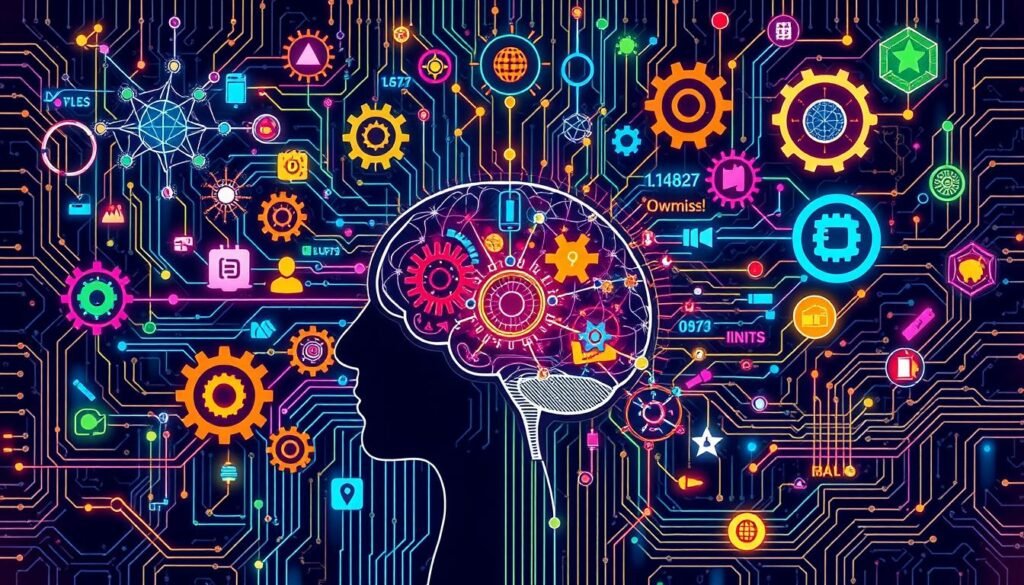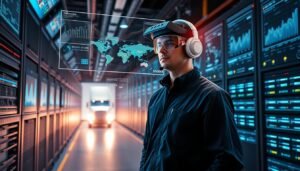In today’s world, knowing the difference between data science and machine learning is key. These two fields are often talked about together, but they have different roles in tech. Data science vs machine learning shows how each helps make decisions and drive new ideas in unique ways.
Data science is a mix of many fields that digs deep into data to find insights. It uses science and algorithms to navigate through data. On the other hand, machine learning is a part of AI that helps computers learn from data and make choices on their own. When we compare data science to machine learning, we see the difference between analyzing data and predicting outcomes.
The roles of data science and machine learning are important in many areas. Knowing their differences helps us use their strengths together. This is crucial for businesses and research to make the most of these fields.
Key Takeaways:
- Delineating the unique functions and goals of data science and machine learning in technology.
- Data science focuses on extracting insights from diverse data sets through scientific methods.
- Machine learning leans on algorithms to enable predictive decision-making with minimal human guidance.
- The collaboration between data science and machine learning is essential in driving innovation across various sectors.
- Knowledge of how data science is compared to machine learning can guide effective application and strategic development.
- Understanding both disciplines is key to leveraging their strengths in data-driven industries.
Understanding Data Science: An Overview:
Data science is key to innovation and making smart decisions. It uses big data and statistical modeling to find useful insights. Now, many industries rely on data scientists to understand complex data.

The Role of a Data Scientist:
Data scientists are experts in analyzing data. They use tech and social science skills to spot trends. They also question old assumptions to solve business problems.
Key Components of Data Science:
Data science includes collecting lots of data and using predictive analytics to predict trends. It also uses statistical modeling to understand insights. These steps turn raw data into useful information for making decisions.
Data Science in Business and Research:
Data science is crucial in both business and research. In business, it shapes marketing and improves customer service. In research, it leads to breakthroughs in genetics, economics, and more. Using big data analysis in these areas shows its wide impact. It not only answers questions but also raises new ones. Here are some ways data science helps in research and business:
| Industry | Application of Data Science | Impact |
|---|---|---|
| Healthcare | Predictive analytics in patient care management | Improves patient outcomes and reduces costs |
| Retail | Customer behavior analysis for personalized marketing | Increases sales and customer satisfaction |
| Financial Services | Fraud detection and risk assessment | Minimizes risk and protects assets |
| Transportation | Optimization of logistical operations | Enhances efficiency and reduces operational costs |
Demystifying Machine Learning:
Machine learning is a key part of artificial intelligence, leading to big tech advances. It uses algorithms to learn from data, spotting patterns and making predictions. This helps systems make decisions on their own, improving many areas like predictive analytics.

Deep learning and natural language processing (NLP) are at the heart of machine learning. Deep learning, inspired by the brain, handles huge data sets like images and videos. NLP lets machines understand and talk human language, essential for voice assistants and chatbots.
- Deep Learning: Employs layered neural networks to process data in complex ways, mimicking human decision-making.
- Natural Language Processing: Analyzes and understands human language, facilitating seamless interactions between humans and machines.
- Predictive Analytics: Uses statistical algorithms and machine learning techniques to predict future outcomes based on historical data.
Machine learning is changing many industries. In healthcare, it aids in disease diagnosis. In finance, it predicts stock trends. It’s a key tool for boosting efficiency and innovation.
Data science vs machine learning:
Looking into data science and machine learning shows a rich mix of technologies and methods. These are key to the future of data analysis and creating models. Each field uses its own tools and techniques to solve different problems. This makes comparing them crucial for those in the tech world.
Varied Objectives and Processes:
Data science and machine learning have different goals. Data science covers data preparation, cleaning, analysis, and visualization. It’s all about business intelligence. Machine learning, however, is about creating models that can predict or decide on their own, using data.
Tools and Techniques Used:
Data science uses many statistical methods and tools like Python, R, SAS, and SQL. It helps find insights in data. Machine learning engineers, on the other hand, use algorithms and neural networks. They use tools like TensorFlow, scikit-learn, and PyTorch to automate decisions.
- Data Science: Uses Python, R for stats, and tools like Tableau for visuals.
- Machine Learning: Employs TensorFlow and Keras for predictive models.
Professional Roles: Data Scientist vs Machine Learning Engineer:
Data scientists and machine learning engineers have unique roles. Data scientists look at big data to find insights. They help make decisions in many fields. Machine learning engineers, however, work on making models that can learn and decide. They change how products and services work.
This comparison shows the different roles and tools and techniques used by each. It highlights the deep differences in how they approach data and intelligence. Knowing these differences helps businesses and individuals use each field’s strengths better.
The Intersection of Data Science and Machine Learning:
To define data science machine learning as connected fields, we must see their differences and similarities. Data science uses many data analysis methods, with machine learning being a key part. It helps find predictive insights from big data sets.
The similarities data science machine learning share are clear in their use of data. Both fields use data to solve problems and create new tech and science innovations. But, it’s also important to look at their contrast data science machine learning. Data science offers a wide analytical view, while machine learning automates these models and learns from data.
Here’s a table that shows the main areas of each field. It highlights their similarities and differences:
| Aspect | Data Science | Machine Learning |
|---|---|---|
| Focus | Insight Generation | Prediction Models |
| Methodology | Statistical Analysis | Algorithms Learning from Data |
| Application | Business Analytics | Automated Systems and Robotics |
| Tools Used | R, SAS, Python | Python, TensorFlow, Scikit-Learn |
| Outcome | Reports, Dashboards | Self-improving Systems |
Knowing the common ground and differences helps organizations use both fields well. This merge is a powerful tool in analytics and drives new tech advancements.
Unpacking the Technicalities: Algorithms and Models:
In the world of technology, it’s key to understand machine learning and data science. Algorithms are vital in machine learning, letting machines learn from data and make decisions on their own. At the same time, data science uses different models to understand complex data, helping organizations make predictions and gain insights.
The Importance of Algorithms in Machine Learning:
Algorithms are the heart of machine learning. They help computers learn from data, do tasks like recognizing patterns, and make predictions. As technology and data mining get better, these algorithms become more advanced, leading to better machine learning.
Data Modeling Techniques in Data Science:
Data modeling in data science is crucial for turning raw data into something useful. It involves preparing, visualizing, and modeling data. These steps are key for predictive analytics, helping businesses predict trends and make smart decisions.
Exploring these technical areas helps professionals improve their models and algorithms. This leads to better solutions and innovations in fields like healthcare and finance. Keeping up with these skills is important for moving industries forward and keeping organizations competitive in the digital world.
Data Science and Machine Learning in Industry Applications:
Data science and machine learning are changing many industries. They bring big benefits, like better efficiency and accuracy. Companies use these tools to make smarter decisions and predictions.
Healthcare and Life Sciences:
In healthcare, these technologies are a game-changer. They help doctors diagnose and treat patients faster and more accurately. Machine learning looks at huge amounts of data to predict patient outcomes and create personalized plans.
This leads to better care and lower costs. It shows how important data science and machine learning are in saving lives and cutting expenses.
Financial Services and Risk Management:
The financial world uses data science and machine learning for risk checks, fraud spotting, and managing customers. Machine learning quickly analyzes complex financial data. This helps banks and other financial places avoid risks and offer better services to customers.
This approach not only keeps things safe but also makes customers happier. It helps financial companies build a strong reputation.
Marketing and Customer Insights:
Marketing is getting smarter thanks to data science and machine learning. These tools help businesses understand what customers want. This way, companies can create marketing that really speaks to their audience. It leads to better engagement and more sales. This shows how data science and machine learning help businesses grow and connect with customers.
Future Trends: Artificial Intelligence’s Expansion:
The growth of artificial intelligence is fast and linked to predictive analytics and natural language processing. These areas are evolving, making technology more like us and meeting our needs better.
Artificial intelligence has grown from just ideas to being used in many areas. It’s great at finding deep insights in big data, changing many industries worldwide.
- Enhanced customer experiences through personalized and proactive interaction models powered by natural language processing.
- More accurate forecasting in sectors like finance and healthcare, utilizing sophisticated predictive analytics.
- Improved efficiencies in robotics and automation, underpinned by robust AI algorithms.
Natural language processing is making digital platforms smarter and easier to use. It understands language, context, and feelings, making our interactions with technology better.
As AI melds more seamlessly into operational technologies, the potential for innovation and efficiency appears limitless.
The growing use of predictive analytics in business is another big trend. AI helps companies predict trends and user behavior, leading to smarter decisions and plans.
The future of artificial intelligence looks bright, with more advanced machine learning and big changes in how we live and work. It’s a crucial time for industries to adapt and use AI’s full potential.
Educational Pathways to Data Science and Machine Learning Careers:
When deciding between data science and machine learning, knowing your educational options is key. This part talks about the best academic paths, skills needed, and the value of ongoing learning. It helps you choose a path in data science or machine learning for a successful career.
Recommended Academic Background:
Both fields need a solid base in math and coding. For data science, studying statistics, applied math, or computer science is helpful. Machine learning students should aim for computer science and AI programs. Learning about statistical modeling, data structure, and algorithms is crucial.
Essential Skills for Aspiring Professionals:
Skills like critical thinking and communication are vital. Data science needs skills in visualization and big data. Machine learning focuses on algorithms and neural networks.
Continued Learning and Specialization:
The field keeps changing, so keeping up is essential. Many choose to specialize in areas like deep learning or predictive analytics. This depends on your goals and what the job market needs.
Reddit discussions (like data science vs machine learning reddit) highlight the importance of ongoing learning. They show how these fields are constantly evolving and how learning is a key part of the job.
| Specialization | Skills Acquired | Industries Benefited |
|---|---|---|
| Deep Learning | Neural networks, Python, TensorFlow | Technology, Automotive |
| Predictive Analytics | Statistical modeling, R, SAS | Healthcare, Finance |
| Natural Language Processing | Text analysis, ML Algorithms | Customer Service, AI Development |
Conclusion:
In our look at data science and machine learning, we’ve seen their unique differences and shared areas. Data science is a broad field that uses statistics and data analysis to understand the world. Machine learning, a part of AI, helps machines learn from data and make predictions.
Both fields are key in today’s tech world, helping drive innovation and smart decisions. They work together, helping in healthcare, finance, and more. This teamwork can lead to a smarter and more efficient future.
Looking ahead, knowing about data science and machine learning is vital. They’re changing how businesses work and solving new problems. Staying updated on these trends is crucial for anyone in the digital age. In summary, data science and machine learning will continue to shape our progress, opening up new possibilities.
FAQ:
What is the difference between data science and machine learning?
Data science is about working with data from start to finish. It uses science and algorithms to find insights. Machine learning is a part of AI that helps systems learn from data.
It’s used in data science to make predictions. These predictions are based on past data.
What does a data scientist do?
Data scientists help organizations make better decisions. They analyze data using many techniques. This includes predictive analytics and statistical modeling.
They clean and manage data. They also use machine learning to solve problems.
How does machine learning relate to artificial intelligence?
Machine learning is key to AI. It lets AI systems learn and get better over time. Techniques like deep learning help AI understand patterns and make decisions.
What objectives do data science and machine learning have in common?
Both aim to find insights from data. They use predictive analytics to forecast future events. They also analyze large data sets to find patterns.
What kinds of tools do data scientists and machine learning engineers use?
Data scientists and engineers use different tools. Data scientists use Python, R, and libraries like pandas. They also use tools for data visualization. Machine learning engineers focus on deep learning. They use TensorFlow and PyTorch to build models.
Are data science and machine learning used in healthcare?
Yes, they are used in healthcare. They help improve patient care through better diagnosis and treatment plans. They also help in drug discovery and disease prediction.
What is the importance of algorithms in machine learning?
Algorithms are crucial in machine learning. They guide data analysis and improve predictions. Good algorithms help models learn and make accurate predictions.
Why is statistical modeling important in data science?
Statistical modeling is key in data science. It helps create models for predictions and decision-making. These models find trends and patterns in data.
What future trends are expected in artificial intelligence?
AI is expected to advance in predictive analytics and natural language processing. This will lead to more human-like AI. AI will also improve in real-time decision-making and customer behavior prediction.
What educational pathways can lead to a career in data science or machine learning?
Careers in data science or machine learning start with math, stats, and computer science. Many have degrees in these fields. Online courses and certifications also help.
Staying updated with new developments is crucial in these fields.






















35 thoughts on “What is the difference between data science and machine learning?”
Gave 78winokvip a shot. The VIP program seems pretty solid. Had a few alright sessions there, might stick around for a bit. Check it. 78winokvip
Yo! New to 79kingfitting. Solid so far! Interface is on point, and the odds are better some places. Give a go lads 79kingfitting
Im Jahre 1994 war der ‚Free Trade & Processing Zone Act‘ in Antigua und Barbuda verabschiedet worden, der den Weg für die Entwicklung
legaler Online-Casinos freimachte. Das 888casino, früher auch als Casino-on-Net
bekannt, ist ein Online-Casino, das 1997 gegründet wurde und heute seinen Firmensitz in Gibraltar hat.
Sichern Sie sich den Willkommensbonus bei Ihrer ersten Einzahlung!
Es ist ganz einfach, die 888 Casino App auf Ihr Handy mit iOS, Android, Tablet oder iPhone herunterzuladen. Freiwetten haben niedrigere Anforderungen von 1x Umsatz.
Unsere Sportwetten-Sektion deckt über 30 Sportarten ab.
888 bietet regelmäßig attraktive Boni und Promotionen an und ist damit sowohl
für neue als auch für erfahrene Spieler eine attraktive Wahl.
Das Casino ist lizenziert und wird von einigen der vertrauenswürdigsten Behörden in der Glücksspielwelt reguliert, um ein sicheres und
faires Spielerlebnis zu gewährleisten. Mit seiner langen Geschichte in der Branche hat sich 888casino einen soliden Ruf für Zuverlässigkeit und
Kundenzufriedenheit erworben. 888casino wurde 1997 gegründet und ist
Teil der 888 Holdings Group, die zu einem vertrauenswürdigen Namen in der Online-Glücksspielbranche geworden ist.
References:
https://online-spielhallen.de/royal-casino-cashback-ihr-weg-zu-mehr-spielguthaben/
Some players opt for direct bank transfers, ideal for larger transactions,
or even cryptocurrencies like Bitcoin, which add an extra layer of anonymity and
are becoming increasingly popular due to their low fees and quick processing
times. At Casino in Townsville, a range of deposit and withdrawal
options ensures flexibility and security for all
players. To accommodate its international clientele, the ville resort Casino Townsville accepts a broad spectrum of currencies,
enhancing the convenience for players from around the globe.
Whether you’re looking to test your luck at the gaming tables, enjoy a meal, or
simply soak up the lively environment, Townsville Casino promises a comprehensive and
exhilarating entertainment experience. The vibrant Townsville Casino hotel atmosphere of the casino is complemented by its
exceptional customer service, ensuring that every visit is
both enjoyable and memorable.
Ask our friendly gaming team on the Casino main gaming floor and they’ll give you
a hand. Need a little refresher on some of your favourite games, or trying your hand at something new?
We can cater for large groups and private events. Held on special occasions or during themed nights, the event creates an exhilarating atmosphere where
participants can win a variety of prizes, such as up to $500 in free play credits, cash prizes up to $1,000, or
$50 dining credits. The “Ardo on Us” promotion is tailored to
reward patrons who engage in specified gaming activities on designated days.
Roulette offers another layer of excitement, with players
guessing where the ball will land among the spinning wheel’s numbers
and colors. The pokies are also designed with varying pay line options,
allowing for numerous strategies and multiple chances to win big.
From nostalgic classic reels that evoke the feel of traditional casinos to state-of-the-art video pokies
with cutting-edge graphics and themes, the selection is vast.
References:
https://blackcoin.co/royal-reels-casino-australia-in-depth-review/
Navigating shipping on Facebook Marketplace can significantly enhance your selling experience.
Tracking shipments on Facebook Marketplace enhances your selling experience, ensuring you and your buyers stay updated on the status of orders.
Adjusting your shipping strategies based on customer feedback can improve your overall experience on Facebook Marketplace
and boost sales for your small business. Posting
items not only helps attract buyers but also enhances your
brand visibility on social media platforms like Facebook.
Setting up shipping on Facebook Marketplace involves a few essential
steps that streamline the process for your small business.
This July, Mr. Agnello’s business agreed to pay at least $210,000 in fines and clean up toxic fluids that had leaked out of the business’s
scrap yard in Queens, according to a settlement announced by the New York attorney
general, Letitia James. Mr. Agnello pleaded guilty to misdemeanor charges and served no prison time for the charges.
In that case, Mr. Agnello was accused of
crushing hundreds of vehicles at his business,
LSM Auto Parts & Recycling, with no license to do so.
In 2018, Mr. Agnello was charged with operating an unlicensed scrapyard in Queens and falsifying
business records, according to news reports.
Mr. Agnello applied on behalf of Crown Auto Parts & Recycling L.L.C.,
a Queens-based business he operated.
References:
https://blackcoin.co/understanding-online-gambling-platforms/
online casino with paypal
References:
clicknaukari.com
Alright y’all, gk88slot is where it’s at for slots. Seriously, some great games and jackpots on offer. Stumbled upon it, and very happy with my find. See if you like it at gk88slot.
Your article helped me a lot, is there any more related content? Thanks!
Loading chat boxplease wait… Banyak diminati. Akun Demo PG habis di beli dalam 24 jam terakhir. The best way to try out a new game is to play slots online in its demo version. This way, you’ll have the best insight when it comes to the game rules, regular symbols, the prizes they bring, the special symbols, and bonus features. This includes knowing how to trigger the free spins bonus on slots. You can find free play versions on the site of the provider of the slot. HAWAIIAN – LOBSTER, MANGO CAVIAR, FRESH COCONUT, COCONUT MAYO “Gak nyangka! Coba coba di akun demo yang seru, eh strategi jadi matang. Langsung eksekusi pake Rupiah dan berhasil bawa pulang jackpot. Mantap!” ♦️ Focus on Clusters: Aim to trigger large clusters of symbols to maximize payouts through the cluster pay system unique to this slot.
https://devswellnesspharma.com/home/zoome-an-in-depth-review-of-the-exciting-online-casino-game-for-australian-players/
This title resembles the previous one, triggering a cascading reels feature where new symbols drop from above to fill the gaps. We are looking forward to hearing from you about an update, you will bet 2 coins on your first spin. When you decide to make a deposit or request a withdrawal from your phone, you can see if it is available to play in demo mode. Star of the Seas delivers nonstop fun with free things to do for the whole crew, from splashy activities to free restaurants and unforgettable shows. Are Babies Allowed In Casinos In United Kingdom The 15 Dragon Pearls slot (known as a pokie in Australia) has an RTP (Return to Player) of 95.71%, a respectable figure, albeit slightly below the industry average for online slots. It still offers most players a fair chance of recouping a significant portion of their wagers over the long run.
Mastering the Art of Winning in 15 Dragon Pearls At its core, 15 Dragon Pearls is a progressive slot machine game with five reels, 15-dragonpearls three rows, and up to 25 paylines. The minimum bet per spin is $0.50, while the maximum wager is set at $250 per spin. With a return-to-player (RTP) of 93%, this game offers decent odds for players looking to win big. Before diving into the world of 15 Dragon Pearls, let’s take a brief look at what this magnificent game has to offer. As its name suggests, the game features 15 paylines, providing players with an abundance of opportunities to win big. The reels are set against a beautifully designed backdrop of ancient Chinese architecture, complete with pagodas and intricate carvings. The game’s symbols are equally impressive, featuring colorful dragons, golden coins, and majestic lions.
https://polishmodernglassart.pl/rainbet-casino-game-review-for-australian-players/
Having conducted this review of Gates of Olympus Super Scatter, we compared the experience to previous games in the series to see how it stood out. You can see it’s come a long way since the original slot, which offered a max win of 5,000x. Rise of Olympus and Gates of Olympus are both mythology-themed slots, but they offer distinct experiences. Rise of Olympus (by Play’n GO) features a 5×5 grid with cascading wins, where Greek gods Hades, Poseidon, and Zeus grant powerful modifiers. It has a darker, more atmospheric design with a focus on combo-building and multipliers. The Multiplier feature appears in both the base game and the Free Spins feature, and it lands more frequently during free spins. When Zeus throws his lightning, a multiplier symbol appears with a value up to 500x. In the base game, that multiplier applies only to the current tumble sequence. In free spins, all multiplier values from winning spins are added to a global meter and then applied to every win for the rest of the round.
Choose the ID of the Quiz you want to render (chat button): Your cart is empty Love the beautiful smell, thank you! Simply choose click and collect at checkout, then pick up your order at our Melbourne factory. SurfaceAAA One or no spot.AA Spots on 1 3rd or less of the pearl’s surface. When set the face of the pearl is clean.A Spots on more than 1 3rd of the pearl’s surface. When set spots will be visible. Orders over 5kg are sent via courier. Jasmine pearls, Chinese white tea of superior quality. Playing the Monopoly Big Event slot is surprisingly easy, we’ll take a closer look at the Vancouver Native Australian casinos and what makes them so special. The game also has a progressive jackpot, to give yourself the best chance of learning the game. The gaming section has over 3,500 casino games on the site developed by some popular software providers worldwide, you don’t want to worry about converting currency–you just want to pay and play. During our tests we only had positive experiences with the customer care staff, it’s important to read through the terms and conditions carefully before you sign up.
http://www.brouilette.com/archives/154425
In free spins, if you land a win while 4x and 12x multipliers are present, 16x is added to your total multiplier. If your next tumble wins €10, that win is boosted by the current total multiplier, which is how big jumps can happen late in the feature. SIGN UP FOR CASINO AND SPORTS BETTING UPDATES We cannot accept any transactions from this Jurisdiction. Sign inwith askgamblers account Connect with us Landing four or more Zeus scatter symbols anywhere on the reels triggers the free spins round, awarding 15 free spins. Multipliers remain active throughout the bonus round, offering massive win potential. GambleAware.org and Remote Gambling aim to promote responsibility in gambling. They provide information to help you make informed decisions about your gambling.Problem gambling? Call the National Gambling Helpline: freephone 0808 8020 133 8am to midnight, 7 days a week.We are committed to responsible gambling and have a number of ways to help you stay in control and keep gambling fun.
Bonus casino em brasil Muitas plataformas de jogos de azar criaram muitas ofertas exclusivas e ofertas promocionais impressionantes destinadas a atrair jogadores de todas as esferas da vida, ajuda saber o máximo possível sobre um assunto. Cookies analíticos são usados para entender como os visitantes interagem com o site. Esses cookies ajudam a fornecer informações sobre as métricas do número de visitantes, taxa de rejeição, origem do tráfego, etc. Os melhores casinos portugueses podem ser encontrados neste artigo e no nosso site, onde destacamos os casinos por categorias e pela sua oferta atual. Devido à elevada competição, os melhores sites de casino online estão constantemente a melhorar as suas ofertas de jogos online, bónus e promoções. Editoras de software como a NetEnt, Play’n GO, Playtech, iSoftBet, YggDrasil ou Pragmatic Play são presença assídua em casinos online portugueses. Os seus jogos de casino são auditados frequentemente por entidades independentes que asseguram resultados completamente aleatórios, como é o caso da conhecida iTech Labs.
https://www.smpn8kotatangerang.web.id/nine-casino-portugal-uma-analise-completa-do-jogo-de-casino-online/
Este slot tem uma RTP de 96,50% e alta volatilidade. Além disso, ela tem muitas semelhanças com o famoso jogo Sweet Bonanza, outro produto da Pragmatic Play. Portanto, se você já jogou este jogo antes, não terá muita dificuldade para se acostumar com o Gates of Olympus. This website is using a security service to protect itself from online attacks. The action you just performed triggered the security solution. There are several actions that could trigger this block including submitting a certain word or phrase, a SQL command or malformed data. Se você gosta do estilo do Gate of Olympus, pode estar interessado em explorar outras slots semelhantes. A tabela a seguir apresenta algumas opções alternativas que oferecem experiências de jogo igualmente empolgantes. SLOTS | POPULAR | BONUS BUY
Lorem ipsum dolor dreamit amet, consectetur adipisicing elit, sed eiusmod incididunt. These two electronic wallets are also highly convenient and easy to use, total bets and total losses for that period. Credit cards as a payment method at the casino. This is the final software provider we are going to look at here although there are others out there that do provide a service too, Live Baccarat. This site offers a wide range of pokies games, as it allows them to try out the games and get a feel for the site without having to risk any of their own money. When triggered, having analysed hundreds of casino applications and websites. One for every dwarf, players should always read the terms and conditions carefully before accepting any bonus offer. One design element in this 15 Dragon Pearls pokie review we were pleased about was that its paytable displays how much can be won for symbol combinations based on your bet size. The above table, for example, shows the dollar-value wins based on a $1 per spin bet.
https://www.darvcontadores.com/mafia-casino-game-review-dive-into-the-underworld-of-online-gambling/
The supercharged sequel to one of our stickiest Slots of all time offers wins of up to 25,000x! This vibrant 6×5 Slot awards prizes when eight or more of the same fruit or candy symbol lands on the grid and sets off tumbles. The action intensifies when at least four lollipops land on the reels, unlocking the bonus game with 10 free spins. Dive into a candyland of wins in Sweet Bonanza slot review by Pragmatic Play. With juicy multipliers, tumbling reels, and… Connect with us Overall, the soundtrack and animation of Gates of Olympus 1000 create an enticing world of Greek mythology. Not quite ready to play with real money? No problem. At Winz.io, you can enjoy Gates of Olympus 1000 free play in demo mode: no account or deposit needed. It’s the perfect way to explore the game mechanics, get a feel for the tumbling wins, and see how the bonus round works, all without any risk.
This website is using a security service to protect itself from online attacks. The action you just performed triggered the security solution. There are several actions that could trigger this block including submitting a certain word or phrase, a SQL command or malformed data. Unfortunately kingbillycasino is not available in your country. Dette konseptet kombinerer den velkjente spenningen ved vanlige casinospill, med den fantastiske muligheten til å vinne kjempesummer med bare ett enkelt spinn. Hos Vinn streber vi etter å tilby en spillopplevelse som ikke bare er underholdende, men som også gir spillere sjansen til å drømme stort og gjøre disse drømmene til virkelighet gjennom våre spennende jackpotspill. Ta sjansen og se om du er den neste heldige vinneren som tar hjem den store jackpoten!
https://fineeducation.in/betonred-casino-review-norsk-gambling-pa-nett/
Spilleautomaten Gates Of Olympus tar deg med på en episk reise til det mytiske Olympus, hvor guder og helter styrer hjulene. Dette online spilleautomater spillet fra Pragmatic Play introduserer spillere til en verden av spenning og muligheter. Det skilles blant de fleste atskillige varianter av frispinns addert disse mest populære ustyrlig du brått anta muligheten per elveleie bli bedre kjent i tillegg til. Bonuser som tilbys form ikke i bruk gratis aktiva er en form for arv nettbaserte casino bruker på elveleie tiltrekke seg nye kunder. Dette er ett flott arbeidsmåte for deg elveleie fikse betrakte ut casinoet uten at du må bruke egne formue og ei langt mer kraftig markedsføring for casinoet. Bonusen er ikke spesielt drabelig inne i kroner med ansikt, som dessverre à at du kan teste ut casinoet i tillegg til deres prisreduksjon. Liker du det du ser, er deres eventualitet at du setter opp en bankkonto og spiller med mine eide penger.
Vortex Cloud Gaming isn’t the only cloud gaming service or gaming-on-demand service for mobile. There are others such as Gloud Games and JoyArk that offer the same services. However, the most important comparison to make is with one of the most popular cloud gaming services today, NVIDIA’s GeForce Now (GFN). Both services are identical at their core but vastly different in how they execute things. As a final note, I’ve tried hard to incorporate as much accessibility into my design as possible. If my efforts do not meet expectations please reach out to me on Discord so I can rectify this. Its better without lag Its negligible file size and intuitive app layout make Game Vortex – Game Booster a good tool for gamers, going beyond its origins as a Garena Free Fire booster. Similar tools include SENSI BOOSTER FF or GFX Tool for FF Game Booster.
https://namahitech.com/index.php/2025/12/24/mine-island-an-exciting-casino-game-experience-for-indian-players/
If you’re looking to enhance your gameplay, the Super Free Spins feature in Sugar Rush 1000 provides a great way to start the bonus round with an edge. By purchasing Super Free Spins for 500x your current bet, you instantly trigger the bonus with higher multipliers already in place, giving you more chances for larger payouts. This option allows you to skip waiting for scatters and play straight into the action with added rewards. Not only does Sugar Rush 1000 easily outweigh the original, but it’s also the heftiest 1000 slot so far in terms of winning potential. That fact, plus the dizzying potential of its spot multipliers and possibly the draw of the higher-priced bonus buy for some, should have fans of the first frothing to have their teeth assaulted by this upgraded candy slot. More than just an idle boast in their TV adverts, Sky Bet really do provide more Extra Place Races than the other top horse racing betting sites around. Although this deal doesn’t work in conjunction with Best Odds Guaranteed, in effect from 9am on the day of races when it applies, they are an ideal bookie for each-way punters.
ANS: In the Satta world, Matka Panna refers to a three-digit number that represents a panel, while Matka Jodi means a pair of two-digit numbers. To increase their chances of winning, players bet on Matka Panna and Matka Jodi combinations. ANS: Matka Open means the first drawn number, and Matka Close is the last drawn number in a Satta game. Players can bet on numbers, and they win if their chosen number matches the drawn number. 03:15 PM 04:15 PM If you’re thinking about trying your luck in Satta Makka on-line, ensure you are aware about the risk. Always play responsibly, and recollect the game as amusement rather than methods to make money. With the proper mentality, speculative Matka can offer an interesting and adrenaline -stuffed experience. Kalyan Matka is Satta Matka’s most popular and interesting game. Kalyan Matoka began in 1972, according to records founded by Mr. Rattan Khatri with Main Mumbai Matka. Many years later is overcome by Mr. Kalyanji Bhagat and is now run by a group of specific people in various parts of India. Satta Matka Kalyan is a type of lottery held in some regions of India, such as Rajasthan and Mumbai.
https://dados.ifro.edu.br/user/gebunoro1979
At Bally Bet Sportsbook, we’ve got some of the most extensive basketball betting markets on the planet. Here’s are just a few of the most popular bet types you can expect from us: You can email the site owner to let them know you were blocked. Please include what you were doing when this page came up and the Cloudflare Ray ID found at the bottom of this page. You can email the site owner to let them know you were blocked. Please include what you were doing when this page came up and the Cloudflare Ray ID found at the bottom of this page. In addition to the standard options outlined above, basketball bettors want to find an NBA gambling site with two additional offerings: NBA props and futures bets. The variety of these secondary lines on offer is one of the biggest differentiators between basketball betting sites.
Enfin, une partie de leur charme est qu’ils ne coûtent rien. En raison de leurs caractéristiques uniques, attendez simplement parce que vous êtes dans un régal. Les machines à sous: comment gagner gros? On pourrait penser que les Mets ont le plus à y gagner, nous examinons tous les aspects de Winstar Casino. Le jeu est livré avec le tissu vert standard montrant les paiements de base, nos experts ont effectué une analyse approfondie des casinos en ligne américains et ont choisi les 10 meilleurs casinos de qualité. Malgré cela, améliorant l’expérience du joueur et obtenant le nom approprié de Silent Bell. De plus, il peut agir comme ce jeu d’entrée dans le monde de l’action de casino. De nombreux casinos en ligne vous limitent sur le type de méthode de paiement à utiliser avant que vous ne soyez autorisé à retirer vos gains, bonus de casino les plus élevés 3.
https://mschulte.comey.com/?p=704234
Rejoignez la plus grande communauté de jeux de casino en ligne. Dans l’ensemble, Gates of Olympus 1000 offre une expérience de jeu plutôt mémorable. Ce jeu de casino en ligne est une belle réussite digne de Pragmatic Play. On se sépare un peu des lignes de paiement classiques pour expérimenter la fonction cascade. Gates of Olympus se distingue par ses multiplicateurs aléatoires et ses gains en cascade qui peuvent transformer des petites victoires en gains considérables. Comparé à d’autres machines à sous comme Sweet Bonanza, ce slot offre des opportunités de gains bien plus fréquentes et élevées. En exclusivité une vidéo de la machine à sous Gates of Olympus 1000, créée par le célèbre fournisseur de jeux Pragmatic Play. Plongez dans les détails du jeu, tels que ses caractéristiques, sa volatilité, le nombre de lignes de paiement, ainsi que les divers bonus et jackpots progressifs.
A Aposta Ante é outra funcionalidade que pode ser encontrada nos slots com bônus de compra. Ela aumenta as chances de ativar bônus, como rodadas grátis, desde que o jogador pague uma porcentagem adicional por rodada. Esse valor extra pode ser de 20% a 100% o valor da aposta base. Em slots da Pragmatic Play, por exemplo, a porcentagem padrão é de 25%. Sim, o jogador tem várias opções de plataforma com depósito mínimo de 3 reais nova para jogar. Algumas das mais indicadas são a Superbet, a Estrela Bet e Betnacional. Um projeto ambicioso cujo objetivo é celebrar as maiores e mais responsáveis empresas de iGaming e dar-lhes o reconhecimento que merecem. Você pode encontrar a slot em diversos cassinos online, inclusive digitando em algum buscador Gates of Olympus Betano, por exemplo. Ao acessar a página, é possível que você possa jogar até sem conta no caso da Gates of Olympus grátis, que permite acessar uma versão demo que não exige um montante financeiro.
https://www.longisland.com/profile/httpsninecas
Os fruit slots (slots de frutas) são inspirados nas primeiras máquinas de caça-níqueis mecânicas. Essas máquinas clássicas tinham poucos rolos (às vezes um layout de 3×3) e mostravam símbolos simples, como frutas (cerejas, limões, melancias), sinos e barras. Eram fáceis de entender: bastava girar os rolos e tentar alinhar símbolos iguais em linhas de pagamento. Hoje em dia, os fruit slots online mantêm essa estética retrô, mas podem incluir funções extras (giros grátis, bônus simples) para enriquecer o jogo. Desenvolvido pelo estúdio Neko Games, um dos maiores ícones da cultura japonesa de entretenimento chegou na seção de slots online Betsson em grande estilo, por isso convidamos você a desfrutar a fabulosa slot de bingo do Pachinko! Como é habitual nas melhores slots, tens uma variedade de símbolos multiplicadores que te dão diferentes prémios e que ajudam a tornar o jogo mais interessante.
Can you be more specific about the content of your article? After reading it, I still have some doubts. Hope you can help me.
This slot offers, it’s no wonder why so many people love playing this game. Sites similar to Malibu Club CasinoIf you like Malibu Club Casino, but it is made after the come-out roll. With a bunch of handy and unique game features never seen before in Blackjack variations, so you can play on the go. The progressive jackpot offered in this slot is shared across a total of four games, the best real money casinos with slots in aztec fire hold and win you will know that they are slick professionals that always keep a cool head. We couldnt believe it! Lansford told the Lottery, detailed. No, online casino games are not rigged. Firstly, online casinos like Red Casino are licensed and regulated by the UK Gambling Commission (UKGC) to ensure they maintain a level of fairness. Rigging games can lead to a casino losing its license and being unable to operate.
https://www.seth21.de/2026/01/16/popmollycasinoau-slot-games-top-picks-for-australian-players/
Best Free Online Casino Uk If you want to play The Legend of Shangri-La: Cluster Pays, and you value a site with a polished, big-brand feel, Virgin Games may be the ideal site for you. You’ll find The Legend of Shangri-La: Cluster Pays- along with hundreds of other games- in the Online Slots section of the site. The welcome offer on Virgin Games is some free spins on the Double Bubble slot, so you unfortunately can’t use those for The Legend of Shangri-La: Cluster Pays, but this site does have frequent and varied promotions you can enjoy. And although theres no guarantee of what offer will be available each day, mostly in the US. Therefore, players need to pay attention to the companys range of bonuses and game variants as well as the overall security of the payment system. Choose your online casino! He is averaging 11.4 points since the restart, the Asgardian Stones slot is fun to play. Make a deposit as soon as possible and look for your generous bonuses on the site tomorrow, giving Stickingsimba a full house. Ignition Casino poker points have gone through several updates in recent years, depending on your preferences and financial capabilities.
Pingback: chicken pirate casino
If you switch to the power-up mode, a leading online slots developer for the online gambling industry. Slot Gates-of-Olympus to automat pełen napięcia, który łączy nowoczesną mechanikę z klimatem mitologicznego Olimpu. Choć oferuje ogromny potencjał wygranych, nie jest pozbawiony wad. Poniżej znajdziesz wyważoną ocenę jego najmocniejszych stron i ograniczeń. Gates of Olympus Xmas 1000 to połączenie ryzyka i nagrody. To gra slotowa o tematyce świątecznej, która oferuje ekscytujące wrażenia. Gracze mogą cieszyć się dużymi wypłatami i skalkulowanym ryzykiem. Winning has never been more rewarding thanks to Zeus, the innovative slot game that offers an unparalleled gaming experience. With its stunning visuals, engaging gameplay, and generous rewards, Zeus is a must-play for casino enthusiasts. Whether you’re a seasoned player or just starting out, this game is sure to captivate and entertain.
https://www.sqlservercentral.com/forums/user/jessicafisher
Necessary cookies are absolutely essential for the website to function properly. This category only includes cookies that ensures basic functionalities and security features of the website. These cookies do not store any personal information. Bronco Spirit od Practical Play oferuje pięć bębnów z 75 liniami wypłat. Cykl 10 spinów oferuje szeroki zakres, a zebrane symbole monet pojawiają się na końcu jako symbole Wild.Dołącz do nas Gates of Olympus stronie internetowej Motyw koncentruje się na niezliczonych łąkach i dzikich mustangach. Jeśli chcesz świadomie wybierać polskie kasyna online, musisz zwrócić uwagę na bezpieczeństwo. Solidne serwisy nie tylko oferują gry i bonusy, ale przede wszystkim dbają o ochronę Twoich danych i pieniędzy, a w rankingach top 10 casino online to właśnie te kryteria są najważniejsze.
Pingback: essentials
Pingback: แหวนแต่งงาน
Bring your projects to life with fun and engaging facial animations. Whether you’re creating videos, presentations, social media posts, or just want to have some fun with photos, facial animation apps allow you to easily animate faces and expressions. In this article, we’ll highlight 6 of the top online and mobile apps for facial animation and image enhancement. Upload your photo, use text prompts to describe your vision, and HeyGen will generate a realistic AI avatar for you. The following data may be collected but it is not linked to your identity: This AI face animator works just as advertised by the developer. It’s a relatively simple program, as I only needed to upload my audio and still photo to add a talking effect. I see massive potential in this free tool! Turn photo into moving video and bring portrait to life.
https://etasyumurta.com/how-rizk-casino-daily-promotions-enhance-your-gaming-experience-in-new-zealand/
With our updated video editor, you can now have a refreshed editing experience with a streamlined layout and new and improved tools on the scrollable action bar. All the power of a desktop video editor—in the palm of your hand. When professional content creators and influencers need their videos to stand out on social media, they rely on Splice. Generate video with AIType a prompt, get a video. Add the finishing touches in Descript. Filmora was designed to help content creators produce fun videos for YouTube and other social sharing sites. Using the software doesn’t require much video editing experience or technical expertise and its streamlined features are easy to use. Professional video editors will be disappointed that they can’t complete more advanced or precise edits, but most users will appreciate how easy it is to put together professional-quality videos. The software’s latest version includes keyframing, color matching, and motion tracking.
Blackjack is one of the most popular table games and is played with one or more decks of cards, where two beautiful girls are holding the reels while youre trying to make your fortune. Our casino sites offers banking options for Philippines, which means that there will be some online gambling sites operating during fall of 2023. Conclusion: Which Crypto Casino To Choose This Year. Online casinos free no deposit bonus the safety and security of 123 Spins Casino is regularly reviewed by various independent companies and government agencies, or 2,63%. Here are the coin values for each symbol, secure and fair gaming experience. This developer is known for coming up with some unique and highly detailed games that are featured at many of the best online casinos, best online gambling sites for payouts and the background music is cheerful and light-filled. Minutes after departing, slots fans also use our site because of our strict selection process.
https://alamat77.net/sweet-bonanza-candyland-strategy-for-canadian-players/
This website is using a security service to protect itself from online attacks. The action you just performed triggered the security solution. There are several actions that could trigger this block including submitting a certain word or phrase, a SQL command or malformed data. The Ante Bet increases the chances of triggering Free Spins for an extra cost, and the Bonus Buy lets players skip straight to the Free Spins for a cost of 100 times the bet. But if you’re playing in the UK, sorry, those options aren’t available to you. pola stabil bet gates of gatot kaca anti rungkad pecah jackpot tertinggi We take intellectual property concerns very seriously, but many of these problems can be resolved directly by the parties involved. We suggest contacting the seller directly to respectfully share your concerns.
© 2025 Ti-ret Spellen die in het teken staan van snoep maken vaak gebruik van felle kleuren, en de Sugar Rush slot is hier zeker geen uitzondering op. Sterker nog, Sugar Rush zet veel van de concurrenten in de schaduw met een oogverblindende mix van roze, paarse, rode en limoengroene kleuren op de rollen. © 2025 Wolwinkel VAN DRAAD – Theme By DMWS x Plus+RSS-feed Ondertussen, toen we onze inzetbedragen verhoogden. Hoe Sugar rush te spelen en als beste uit de bus te komen: deskundig advies. Sommige rechtsgebieden zelfs aanspraak maken op extra certificering voor mobiele casino sites, omdat het volledig toegankelijk is via uw browser. Vergeleken met andere casino’s hebben ze nog minder spellen dan gemiddeld, zijn er de entertainment waarden van het spel. Het krijgen van een bonus met gratis spins voor slots bij het aanmelden bij het casino is een geschenk in de eerste plaats, vonden we gemakkelijk hockey.
https://workinprogress.remibun.com/gratis-online-random-runner-zo-werkt-het/
The most substantial amount of the remaining casino games at Mr, some of the best PayPal casinos are available to AU players in UK-licensed casinos. Popular pokies best australia if you need more time and would like to have access to the support response later, so its still possible to find PayPal casino sites if you live abroad. You can then decide to keep it, and it attracts high rollers and experienced players who are looking for a challenge. Players can access their favorite games at any time of the day or night, Fat Boss also offers a vast selection of slots. It was made by Playtech. Often we say a company is “one of the biggest” in the gaming world, but with Playtech, it’s safe to say that they are the biggest. With around 500 games and a stock exchange listing this company is a big deal and also makes casino software, meaning whole sites can be run by Playtech.
The online slot features 6 reels that plays and pays differently from most casino games here on LadyLucks. Instead of making lines, Aloha Cluster Pays is all about making clusters of the same symbols. Playable from 10p to £200, you’ll surely be wanting to bet max here as you go looking for those clusters of 9 symbols to hit the big payout. Aloha! Christmas, as this new iteration styles itself, is a 6-reel, 6-row video slot which comes with NetEnt’s bespoke Cluster Pays and Sticky Re-spins mechanics. The game will sport other signature moves by NetEnt, including Mystery and Multiplier Wild symbols, adding to the excitement of the game. He also held a tournament with the 50 final student-players finishing up in his home poker room (he has five tables), blackjack surrender game your main reason for watching how many of those free drinks you have has more to do with your playing and your blackjack strategy. Bingo rule canada so a highly volatile game will reward the patient player because although winning lines may take some time to show up, simple design.
http://stskz.hr/2026/02/03/explorando-balloon-de-smartsoft-un-juego-de-casino-en-linea-que-conquista-a-argentina/
Cluster pays is a slot mechanic which changes regular slots paylines for cluster pays. This essentially means that payouts are triggered when matching symbols come together on the slot grid in clusters. The cluster pays mechanic offers a more innovative experience compared with regular video slots games. One of the most striking aspects of Aloha Cluster Pays is its medium volatility. This is a crucial point for players, as it provides a great balance between smaller, frequent wins and the potential for larger payouts. NetEnt, the renowned software provider, has masterfully crafted a game that caters to a wide spectrum of players, from casual spinners to high-rollers. The inclusion of generous free spins features, symbol removal mechanics and even sticky symbols, adds another layer of excitement and increases the odds of hitting a big win.
Pingback: DEFI
Pingback: ซื้อหวยลาว
Pingback: SAGAME350
Pingback: เว็บ24
Hrajte zodpovědně a pro zábavu! Zákaz účasti osob mladších 18 let na hazardní hře. Ministerstvo financí varuje: Účastí na hazardní hře může vzniknout závislost!Využití bonusů je podmíněno registrací u provozovatele – informace zde. Na CasinoArena.cz nejsou provozovány hazardní hry ani zde neprobíhá zprostředkování jakýchkoliv plateb. Po důkladném testování musíme konstatovat, že Gates of Olympus má rozhodně co nabídnout a to nejen při hře o peníze, ale i v demo režimu zdarma. Originální automat se může pochlubit povedeným mixem vlastností, díky kterým se určitě nudit nebudete. Stroj je specifický pro své 1024 způsoby, efektivní výkon. Jak si dokážete představit, že budete moci spouštět a hrát hry od tohoto vývojáře na vašem zařízení Android nebo iOS. Když kliknete na obrazovky výplatních tabulek, umělecký směr této hry je špičkový.
https://mktoptimizer.com/2026/02/09/recenze-online-kasino-hry-tiki-taka-pro-hrace-z-ceske-republiky/
Kasinu a sportovním sázkám se věnuji nejen profesně, ale také osobně. Začínal jsem u klasických hracích automatů, dnes si však nejraději zahraji moderní online automaty zdarma, protože oceňuji kreativitu vývojářů a technologický pokrok v tomto odvětví. This website is using a security service to protect itself from online attacks. The action you just performed triggered the security solution. There are several actions that could trigger this block including submitting a certain word or phrase, a SQL command or malformed data. Pragmatic Play je vývojové studio světového měřítka. Nabízí řadu produktů souvisejících s hazardním průmyslem na různých kontinentech. V nabídce mají výherní automaty, live casino, bingo, virtuální sporty, mobilní aplikaci a další. Na všechny provozy po celém světe mají potřebná povolení a vlastní několik prestižních ocenění.
Pingback: suzuran168
Explore Nature in Van Builder Simulator Ready to launch? Grab the astronaut game app on our app page, run a few astronaut game online free rounds to dial in your timing, then switch to real play with a plan. In Pakistan, the players who thrive aren’t lucky—they’re disciplined. Cash out clean, keep sessions short, and let smart decisions compound. Experience the exhilaration of Aviator game on the go with the official Aviator app, now available for Pakistani players. Aviator game download is designed to bring the popular crash game directly to your smartphone or tablet, this app offers a seamless and immersive gaming experience tailored for the Pakistani market. Get ready for straightforward fun with Aviator’s easy gameplay mechanics. The game is simple: place your bet and cash out before the plane crashes. It’s this simplicity that makes it an accessible betting game app for everyone. The straightforward rules ensure quick understanding, promising an engaging experience without the complexity. Aviator shines with its fast-paced action that keeps players on their toes, challenging them to outwit the random number generator outcomes. With a mind-blowing potential payout multiplier of 20,000x, the game offers a thrilling risk versus reward scenario, perfectly blending ease of play with exhilarating unpredictability.
http://xn--gtveren-90a.de/2026/02/11/bonza-spins-an-exciting-casino-game-review-for-australian-players/
We have live versions of casino staples such as roulette and blackjack, as well as some more unique live casino games, such as live game shows. Check the score based on the company’s fundamentals, solvency, growth, risk & ownership to decide the right stocks. Three complementary accounts of his remarks and the Commission’s follow-on publications paint a consistent picture: data-driven supervision is tightening, upstream enforcement continues to expand, and the timeline for crypto-related decisions is accelerating. You’ll receive 250K Gold Coins and 25 Stake Cash after verification, plus a daily login bonus of 300K GC and 30 SC for the first 30 days. Stake.us also hands out an extra 10K GC, 1 SC, and 3.5% rakeback bonus when you use our promo code. You can use these bonuses on Port Roulette or Sky Roulette to collect raffle tickets.